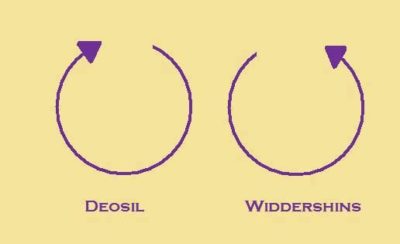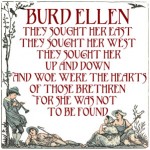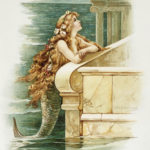Mamacita says: I have always loved fairy tales. I do not mean the insipid heavily-edited baby-tales, all with happy endings, the Disney-fied versions; I am speaking of the real thing: stories full of blood and guts and red-hot spikes and death and endings-that-are-not-always-happy and the accidental lunching on one’s infant and the horrendous consequences of not following directions or keeping oneself moral.
Mom had a large thick book of fairy tales when we were kids. One of my favorites was a tale not as popular as Cinderella, or Snow White, or Sleeping Beauty, etc. One of my favorites was the story of Burd Ellen, and her brothers.
I loved this story on so many levels. . . . but one of those levels was the vocabulary. It was full of many-syllabic wonders: words that the second and third grade world would have shortened and made politically correct in a whipstitch.
My favorite word in this story was “widdershins.” (Antonym: deosil)

Widdershins and deosil
Its meaning wasn’t explained within the story, and I liked that, too. It meant that I got to pull down the absolutely immense dictionary and look it up. And while I had the dictionary down, I got to look at the shiny slick pages of world flags, and jewels, but I digress.
I’m not going to tell you the definition, either. That’s not how I teach. By now, you should be interested enough to find out by yourself. You know, like real students do.
Widdershins. Burd Ellen was snatched up by evil elves and taken to fairyland  because she went widdershins around the church. I was lost in fascination by this word and by this concept. She and her brothers were caught up in playing and forgot the warning and she went widdershins around the church, chasing the ball.
because she went widdershins around the church. I was lost in fascination by this word and by this concept. She and her brothers were caught up in playing and forgot the warning and she went widdershins around the church, chasing the ball.
Please, take your children to the library and check out a big thick book of UNABRIDGED fairy tales. Don’t waste your time with anything that’s been edited; you want the real thing, the genuine unadulterated scary bloody real thing. Abridgments are the devil. Yes, THAT devil. Do not allow an abridged ANYTHING in your home; it will devour your soul and make your children stupid.
Some “experts” claim that scary stories traumatize children. I do not believe that. This is not to say that your five-year-old would do fine with Steven King, no, not at all. Context, y’all. But a good satisfying scary fairy tale? Go for it. I can still remember sitting with that huge book, projecting myself into the illustrations, and grooving on the musicality of the language. I can remember coming to the end of a story and closing the book, thinking satisfactorily that since the wicked stepmother is dead, she’s not OUT THERE any more, and not only is Cinderella safe from her grasping hands, but so am I!!!
Whereas the Disney stepmother was forgiven, which means she’s still OUT THERE, and no little child is safe.
The little mermaid died, too, but it was the only honorable way out for her. Once she got legs, walking was like being sliced by sharp knives, and with legs, she had to get married to get a soul or vanish completely. The very obnoxious prince she wanted was already married, so it was murder him in his bridal bed or dissolve. She dissolved. Word to Disney.

Hans Christian Anderson’s Little Mermaid
I love Disney animated movies, don’t get me wrong, but those are not the real stories. I also understand that these stories were passed from generation to generation verbally, and if you’ve ever played “Secrets” at a party, you’ll know how much even a simple sentence will change as each person whispers what they think they heard to the next person. Once written down, though, the stories started carving themselves in stone, and those are the versions I love best. I’m not saying YOU have to love them best, but I think we should understand the dark underbelly of “Happily Ever After.” I wish parents and teachers would expose children to the real thing, in print, and refuse to allow those sissy censored edited changed and WRONG WRONG WRONG books of these stories to grace the bookshelves of our schools and homes. Let the kids experience the wonder and satisfactory retributions and blood and guts and weeping and punishments and VOCABULARY of these stories, exactly as the authors and re-tellers put them down in the first place. It creates opportunities for comparison/contrast, too. Run with it.
I can close my eyes and remember those illustrations. There weren’t very many, because too many pictures in a good book is an unpleasant distraction, but those pictures that were there, were, to quote Spencer Tracy on Katherine Hepburn, “cherce.”
Widdershins. Burd Ellen. I hadn’t thought of Childe Rowland in years, but I thought of it this afternoon whilst chatting with a dear friend; he used the word “widdershins’ and I was transported back to my childhood, poring over that big thick book, fascinated by the picture of the big gothic church and the young girl chasing a ball widdershins around it, not to reappear. I remembered how much I loved it.
Widdershins and its antonym, deosil, are associated by some people with the occult, but don’t let the undereducated fears of such people influence you. Go HERE, and become enlightened at once. Do not skip the big words. That is what your dictionary is for. If you know how to use context clues, you won’t need a dictionary, even.
And contrary to what the not-very-good elementary teachers might think and say and do, small children love big words, and the best way for them to learn them is for them to hear them.
Condescension is never a good thing, and dumbing-down, editing, and changing all the cool big words into stupid tiny words is an insult to our young people.


Loved your comments. Just wanted to say that the Burd Ellen fairy tale was most certainly one of my favorites. Something mysterious lingered after the telling of that tale. So much magic it in. My father read me to sleep with that big book and I too remember that illustration of that Gothic church. Childe Wynde…all of those wonderful tales will live forever in me.
I remember, also, that Burd means something (I thought “sister.”) Online Etymology writes: Burd (n.) poetic word for “woman, lady” in old ballads; later “young lady, maiden;” c.1200, perhaps from Old English byrde “wealthy, well-born.” Or a metathesis of bryd “bride.” The masculine equivalent was berne.
I got widdershins reading that… like you, I prefer the REAL stories and not the scrubbed down, bleached and spun stories that are presented in books and movies. Kids need a little terror in their lives. It leads to fertile imaginations.